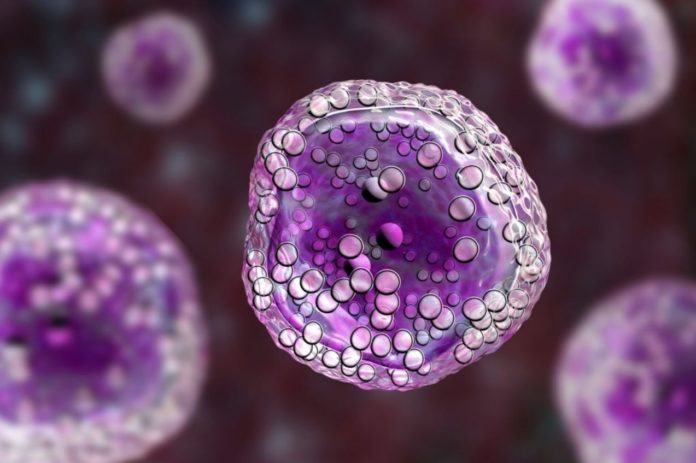New research presented by Johns Hopkins University has discovered a specific protein that can help stop tumor cells from entering the bloodstream and spreading to other parts of the body.
“We have discovered that this protein, TRPM7, senses the pressure of fluid flowing in the circulation and stops the cells from spreading through the vascular system,” said Dr Kaustav Bera, the study lead author.
“We found that metastatic tumor cells have markedly reduced levels of this sensor protein, and that is why they efficiently enter into the circulation rather than turning away from fluid flow,” said Dr Bera.
- Brief Anger Hampers Blood Vessel Function Leading to Increased Risk of Heart Disease and Stroke – New Study
- New Blood Test Pinpoints Future Stroke Risk – Study Identifies Inflammatory Molecules as Key Biomarker
- Enceladus: A Potential Haven for Extraterrestrial Life in its Hidden Ocean Depths
- New Experiment: Dark Matter Is Not As ‘DARK’ As All We Think
- Scientists in Fear of This New Predator From Red Sea Eating Native Species in Mediterranean
The results of the study, published in Science Advances, help understand a little-understood part of metastasis called intravasation, when cancer cells that have separated from a primary tumor enter the circulation in order to travel to other parts of the body and establish colonies.
The researchers further point out that artificially increasing the expression of TRPM7 in tumor cells may help prevent intravasation–and ultimately metastasis–in its tracks.
Typically, cells in the human body, such as muscle cells, fat cells, and epithelial cells, remain confined inside their respective areas. Blood cells, which patrol the body battling infections, are the main exception. Cancer cells, on the other hand, contain mutations that allow them to move and spread.
It is at this point of spreading that cancer becomes much more dangerous.
The researchers used a process known as RNA interference to block the cells from expressing TRPM7. What they observed was striking, they say. When this sensor protein was disabled, the healthy cells no longer reversed direction in response to the flow.
“Imagine you then pick up the kettle with an oven mitt, which reduces your sensitivity to the heat,” said senior study author Konstantinos Konstantopoulos, a professor of chemical and biomolecular engineering and member of the Johns Hopkins Kimmel Cancer Center.
“Many people will be diagnosed with a primary tumor, but as long as this tumor is contained, a surgical procedure can save the person,” said Christopher Yankaskas, a lead author and former member of Konstantopoulos’s lab who is now a scientist at Thermo Fisher Scientific.
In subsequent experiments, the researchers found that normal cells had higher levels of TRPM7 than sarcoma cells (a type of cancerous tumor cells), and that artificially expressing the protein in the tumor cells increased their sensitivity to the fluid flow.
A separate analysis of human patient data showed that those with osteosarcoma, breast, gastric, and liver cancer who expressed high levels of TRPM7 were more likely to live longer than those with lower levels of the protein.
More research is needed, but the team hopes that the findings could eventually lead to new cancer therapies using CRISPR activation, an exciting emerging DNA editing tool.
- Brief Anger Hampers Blood Vessel Function Leading to Increased Risk of Heart Disease and Stroke – New Study
- New Blood Test Pinpoints Future Stroke Risk – Study Identifies Inflammatory Molecules as Key Biomarker
- Enceladus: A Potential Haven for Extraterrestrial Life in its Hidden Ocean Depths
- New Experiment: Dark Matter Is Not As ‘DARK’ As All We Think
- Scientists in Fear of This New Predator From Red Sea Eating Native Species in Mediterranean
“We’ll need further developments before we can take this to the clinical setting, but we believe we provide, for the first time, a definitive picture of the role of TRPM7 in a crucial step of tumor metastasis,” said Konstantopoulos.
Image Credit: Getty
